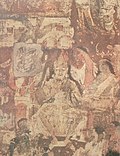Sinhalese monarchy
| King of the Sinhalese Kingdom | |
|---|---|

Royal Standard of the King of Kandy in 1815
|
|

Vijaya the first Sinhalese King
|
|
| Details | |
| First monarch | Vijaya |
| Last monarch | Sri Vikrama Rajasinha |
| Formation | 543 BC |
| Abolition | 1815 |
| Residence | Tambapanni, Anuradhapura, Pulatthinagara,Polonnaruwa, Dambadeniya, Gampola, Kotte, Kandy |
The Sinhalese monarchy was the monarchical head of state of the Sinhalese Kingdom, an absolute and hereditary monarchy. The monarchy traces its origins to 543 BC with the arrival of Prince Vijaya and his founding the Kingdom of Tambapanni. The monarchy existed for over 2300 years. Tambapanni and its successive kingdoms were situated in what is presently Sri Lanka. The monarchy ended with Sri Vikrama Rajasinha of Kandy in 1815 after generations of European influences and upheaval in the royal court.
The monarchy comprised the reigning monarch, his or her family, and the royal household which supports and facilitates the monarch in the exercise of his royal duties and prerogatives.
The origins of the early Sinhalese kings are the settlement of North Indian Indo-Aryan immigrants to the island of Sri Lanka. Sri Lankan historian Senarath Paranavithana suggests, and according to the story in the Divyavadana, the immigrants were probably not led by a scion of a royal house in India, as told in the romantic legend, but rather may have been groups of adventurous and pioneering merchants exploring new lands. These immigrants would have been of all ages and probably originated from multiple regions, arriving in more than one stream, each with its own leader. We know from early Pali writings that Indian merchants of the time travelled to the island in search of the pearls on its North Western coast and precious stones in the island's interior. In the course of time some of the settlers would have settled down in order to supply valued merchandise to their compatriots who would periodically visit the island.
...
Wikipedia
